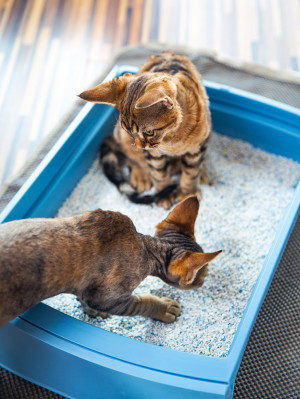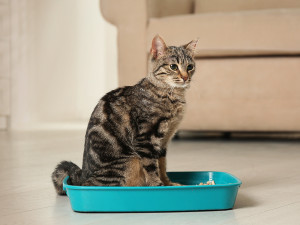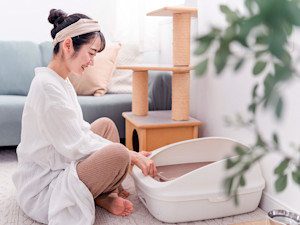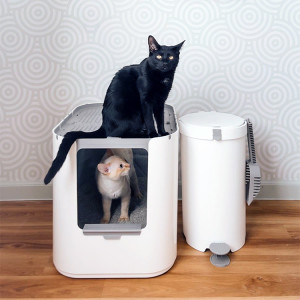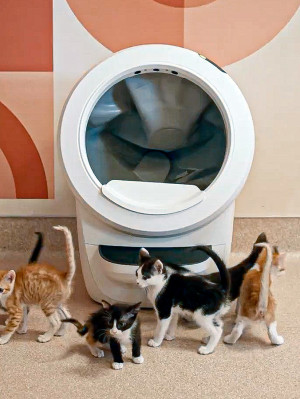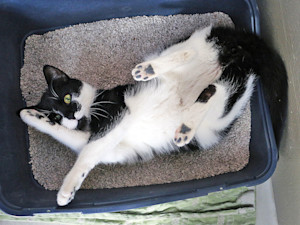Top 6 Most Common Reasons Why Your Cat Is Eating Litter
It’s not only gross — it’s probably a sign that something is not quite right in your kitty's kingdom.
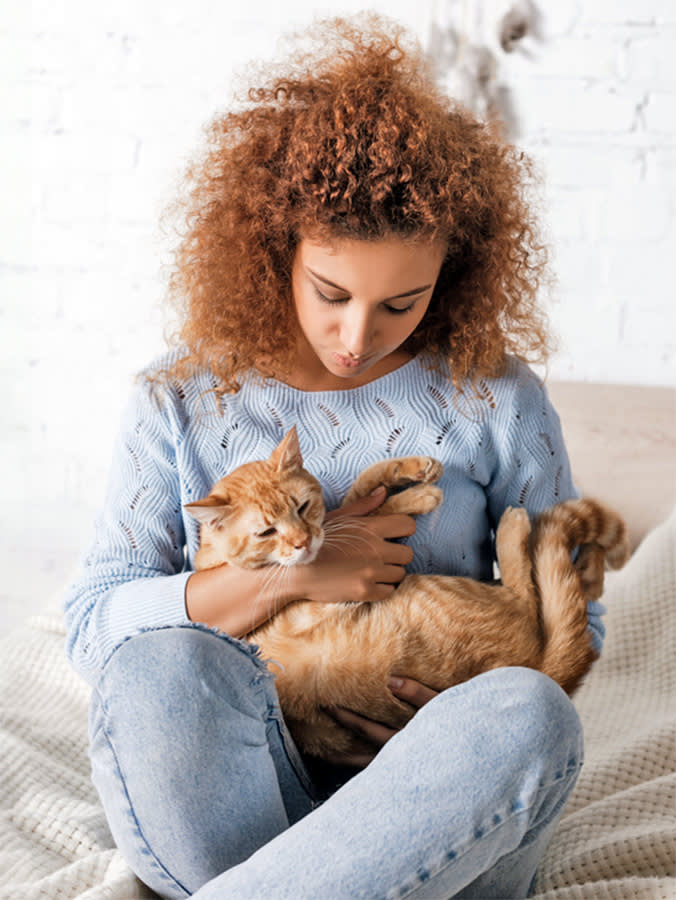
Share Article
In This Article:
Is It Normal for Cats to Eat Litter? Why Is My Cat Eating Litter? Is Litter Toxic for Cats? What to Do if Your Cat Has Eaten Kitty Litter How to Prevent Your Cat From Eating Kitty Litter
Dogs are often considered the “oral explorers” of the pet world, with some carrying objects around and others taste-testing their environment. Cats, while not as obvious, can do the same things as a way to get information about the world around them. To that end, one not-so-normal thing that they may do is eat cat litter.
It’s gross, yes, and may make you think twice about allowing that rough little tongue to lick your arm. But it could also signal that all is not right with your cat’s inner workings.
Eating cat litter can be due to many reasons, six of which we’ll discuss here. And don’t worry, we’ll also give you some tips on how to stop it, so you can play a part in your cat’s communal grooming once again.
Main takeaways
The reasons a cat may eat litter can stem from both behavioral and health issues.
Eating cat litter can be dangerous to your cat, potentially requiring veterinary intervention.
Understanding what’s causing your cat to eat litter and correcting it is the best way to prevent it from continuing to happen.

Is it normal for cats to eat litter?
Is eating cat litter normal for cats? No. Is it common? Yes. Your cat is not alone in this eating habit — but that doesn’t make it normal or OK. First of all, cat litter offers no nutritional value, and it can even be dangerous if eaten. Secondly, eating cat litter often means that your kitty needs something that eating cat litter simply won’t fix.
Why is my cat eating litter?
Eating cat litter and other non-food items, is known as pica in the veterinary world. It’s not uncommon for catsopens in new tab, especially youngsters, but is something you’ll want to curb by pinpointing the cause. Consider enlisting the help of your veterinarian during this discovery phase.
Nutritional deficiency
A cat has nutritional needs just like we do. They need a balanced and high-quality diet to meet those needs, but sometimes covering those bases is not as simple as laying down kibble. Some foods just don’t hack it, especially for every kitty. This is even more of an issue for cats who prefer dog food or human food over their feline portions. To self-balance their diet, they may add cat litter in there to fill their stomachs or get what their body is craving.
Boredom
It may seem like your cat prefers to nap their day away, but they actually need a bit of mental and physical exercise. Left to their own devices, your cat may get into a little trouble and look to their litter box for entertainment.
Curiosity
If cats weren’t curious, there wouldn’t be a catchy saying about it. Sometimes that curiosity borders on weird, and finds them making alternative snack choices. This can mean nibbling on cat litter, especially for kittens who are trying to make sense of their world.
Stress and anxiety
Cats seem to lead a charmed life. Food and love are showered on them every day. But that doesn’t mean they don’t experience stress and anxietyopens in new tab. In fact, cats can become easily stressed if their normal flow gets disrupted. Rather than eating their feelings by way of ice cream, a cat may resort to eating cat litter instead.
Internal parasites
Do we really need another reason to keep our cats parasite-free? Not only are internal parasites, such as worms and protozoa, stealing nutrients from your cat and potentially causing diarrhea and bad breath, they may also entice a cat to eat things like cat litter. Maybe it’s because heavy parasite loads can increase a cat’s hunger, or maybe it’s because your cat wants to dislodge those nasties and rid their bodies naturally. Whatever the reason, internal parasites may be behind your cat eating cat litter and other non-food items.
Anemia
Red blood cells have a major responsibility: They carry oxygen to all body tissues to keep them productive and alive. When red blood cell numbers get low (a condition called anemiaopens in new tab), a cat may try to compensate by boosting their nutrient intake, sometimes by eating cat litter. While we know that cat litter is a poor source of nutrients, your cat is doing their best to correct the problem.
Is litter toxic for cats?
There are so many cat litter varieties available on the market that it’s difficult to make blanket statements about their toxicity. Some can be toxic when eaten, some not. But all are considered bad and not something you want your cat to eat. Here’s why.
Biodegradable choices, such as corn or wood litter, can harbor fungus that can be toxic, potentially causing vomiting, diarrhea, and liver damage. Pine shavings may contain a compound called phenol which is also toxic.
Clumping litter, including silica, forms a cement-like compound when it meets water. Your cat’s digestive tract is filled with water, setting them up for possible obstructionsopens in new tab.
Paper cat litter, though not clumping, isn’t digestible either and may cause intestinal obstructions.
What to do if your cat has eaten kitty litter
With any luck, if your cat ate litter, it was just a small amount. You will want to monitor them for any digestive issues — such as vomiting, diarrhea, or appetite loss — and then try to understand what’s behind this behavior so that you can fix it. But if your cat is making a habit out of eating cat litter, or has helped themselves to a large amount, see your vet.
What can a vet do for cats who eat kitty litter?
The first thing your vet will do is give your cat a thorough exam. They’ll want to check for blockages and other digestive issues. From there, bloodwork and imaging may be needed to make sure the litter isn’t causing any issues and to find out what’s behind your cat’s litter cravings.
Intestinal obstructions caused by litter may require surgery to remove or hospitalization to work through. Parasites and nutritional deficiencies can be corrected with medication and a diet change, and anemia can be treated based on the cause.
Treating boredom and anxiety will fall on you, so be prepared to set a schedule for your cat that includes exercise, playtime, and social interactions.
How to prevent your cat from eating kitty litter
Of course, the best way to deal with your cat eating cat litter is to not have them start in the first place. That’s easier said than done in some cases, but you can do your best to prevent it by making sure your kitty is as healthy as possible. Regular veterinary care can help ensure that your cat is eating a balanced diet and is free from parasites.
Making your cat’s home life even more cushy can help ward off stress and anxiety, so make sure your kitty always has the resources they need without competition, and that they get plenty of stimulation and affection. Keeping your litter box clean helps as well.
See your vet any time you’re concerned about your cat eating litter, or for that matter, anything else abnormal.
FAQs
Is my cat eating litter out of boredom?
Boredom can be behind your cat’s litter snacking, especially if they’re an only pet and you’re away most of the day. Checking in with your veterinarian is always a good first step toward making sure your cat doesn’t have a health issue. From there, you can try enriching your cat’s time with interactive toys or even a furry playmate to see if that helps.
Could my cat’s litter-eating be a sign of a health problem?
If your kitty isn’t getting what they need nutritionally, they will look elsewhere to find it. Health issues such as anemia and hyperthyroidism can cause your cat to eat things they shouldn’t. So, be sure to check in with your vet if your cat has made a sudden turn towards cat litter in their diet.
What is pica?
Pica is the act of eating non-food items, including cat litter. Pica can be dangerous to your cat’s health and can be brought on by behavioral or health problems. So seeing your vet is always encouraged.
Why is my cat eating litter all of a sudden?
Eating cat litter can be caused by health issues as well as behavioral ones. Suddenly deciding to eat it may mean that your cat has a health condition. It can also mean that they are feeling stressed or anxious, and they might need a change in their routine to address it.
References
“Anemia.” Cornell College of Veterinary Medicine. https://www.vet.cornell.edu/departments-centers-and-institutes/cornell-feline-health-center/health-information/feline-health-topics/anemiaopens in new tab.
“How to Help Cat Stress and Anxiety.” Banfield Pet Hospital. https://www.banfield.com/Wellness-at-banfield/kitten-hub/cat-anxietyopens in new tab.
“How to Spot Intestinal Obstruction in Cats.” Kingstowne Cat Clinic. 10 Jan 2020. https://kingstownecatclinic.com/2020/01/how-to-spot-intestinal-obstruction-in-cats/opens in new tab.
Kinsman, Rachel, Rachel Casey, and Jane Murray. “Owner-Reported Pica in Domestic Cats Enrolled onto a Birth Cohort Study.” National Laboratory of Medicine. 12 Apr. 2021. https://pmc.ncbi.nlm.nih.gov/articles/PMC8070519/opens in new tab.

Dr. Chyrle Bonk, DVM
Dr. Chyrle Bonk has been a mixed-animal veterinarian since 2010, with a special interest in rehabilitation. When she's not practicing or writing about veterinary medicine, you may find her exploring the outdoors with her family or tending to her cows, horses, chickens, or cats and dogs.
Related articles
![Woman cleaning cat's litter box.]()
How to Clean a Litter Box
Cats appreciate a clean bathroom as much as you do.
![Two cats with ModKat litter box.]()
The Best Litter Box Covers in 2024
Cover that sh*t up.
13 Reasons Why Your Cat Is Peeing Outside the Litter Box, and How to Fix It
Our experts reveal why this might be happening.
Can You Flush Litter?
No. And here’s why.
![Kittens and the Litter Robot kitty litter box.]()
The Best Litter Boxes for Kittens in 2025
Help your little one learn the ropes.
![Funny black and white cat laying in litter box.]()
Why Is My Cat Chilling in the Litter Box?
Here are four reasons why the litter box is your cat’s new favorite spot.
